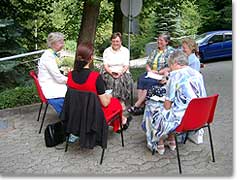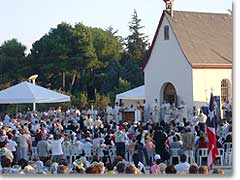 |
|
Una iglesia de pequeños grupos A church in small groups Eine Kirche kleiner Gruppen |
|
 |
|
Disfrutando de la “gracia de ser diferente” Enjoying the grace to be different Freude am Anderssein |
|
 |
|
Un iglesia que ofrece sus tesoros… A church that offers her treasures Eine Kirche, die ihre Schätze anbietet |
|
 |
|
Una iglesio peregrina... A pilgrim church Eine pilgernde Kirche Fotos: POS Fischer © 2005 |
|
|
ROME, Father Alberto Eronti. When Father Kentenich was asked about the purpose of the Work that he had founded, he said that he wanted to offer the Church "the new man and new communities, for the new times". This means that the Holy Spirit gave Father Kentenich a special talent for achieving the work of "the new times, for new times" and that he founded it, in its spirituality as well as in its structure. According to the opinion of many people one of the challenges that Pope Benedict XVI has, within the interior of the Church, is the question of Diaspora.
The topic is not new, the theologian, Karl Rahner had already spoken about it in his book "Mission and grace" (1966). This great theologian recognized that the Church has found itself in this situation for the first time, since the IV century. The word Diaspora is of Greek origin and means "dispersion". This is how the Church lived in the early centuries. Saint Peter wrote this in his First Letter: "Peter, apostle of Jesus Christ, to the sojourners of the Diaspora. (1 Peter 1,1). Why is this expression being used again after 16 centuries? The Canadian theologian, J.M. Tillard recently wrote an article with a surprising title: "Are we the last Christians?" In the article he affirms that we are not the last Christians, but we are the "last witnesses of a certain way of being Christian" What is over, is the so-called Conventional Christianity", described by the Dutch theologian, W. H. van de Pol. He identifies "conventional" as "established and accepted" but not lived. That is to say: a truth is known, but it is not really lived in reality. Father Kentenich called this, "mechanistic" and the Vatican Council defined it as "the drama of Christianity: the separation between faith and life"
If we agree with what is said, then we agree that the Church of the XXI century definitely needs to respond to an old reality for her and new one for us: diaspora, is a consequence of the unbelief that is nourished by laicism and the question of truth and morals; which is heard by majority of people. Now, if we believe that Father Kentenich gives a contribution for this to happen, we must learn from Family history, just as he would. We need to focus on the history of the family in order to become aware of the problems of the Church and of today’s society. This can be found in Father Kentenich’s thinking. Providence gave him and us an insight into these problems and to some extent the solutions. He asks us to believe in faith that we are the trustees of a gift for this Church that is already going through the new times and because of this, we should renew ourselves in mission consciousness.
To help us reflect on this, it would be advantageous to know what is being seen and heard about this "new Church" by the theologians, pastors, sociologists, and Movements. The four most common are as follows:
Disciples with an experience of God
In the past, it was enough for us to be recognized as being Christian. In the future, it is precisely because of this, that people will leave Christianity. Rahner was correct when he wrote: "the Christian of the future will be "mystic", that is to say a person needs to experience Jesus Christ, or he will not be Christian". Job expressed it so philosophically: I heard of you by word of mouth, but now my eye has seen you. (Job 42, 5) The word "mystic" and the expression "my eyes have seen you" should not scare us. They refer to something very personal about the Schoenstatt spirituality: the experience of God is simply, a human experience with a religious interpretation. It is about the God of life, of our life. The disciple of Jesus is the person who has received the capacity to recognize the profound meaning that events carry within themselves. The fruit is not recognized: the grace of being deeply embedded in God.
Evangelic radicalism
When we read in the Acts of the Apostle we are impressed by the enthusiasm of the first followers of Jesus. The word "enthusiasm" comes from Greek and it means "possessed by God". It can be defined as "an intense experience of God which gives impetus to a joyful action". When Christianity is changed in the "official religion", what is produced is what M. Weber called "the return of the revolutionists to daily life"; the result is clear: what many call "the light religion". A comfortable religion which does not expect much and co-exists with other loyalties, which are not religious and this is what characterizes many Christians today. For us it is about the "grace of interior transformation and mission zeal".
The grace of being different
The first Christians were known as the "saints", that is to say the "exceptional ones, the special ones" They were known for how they lived and spoke which "gave a reason" for their faith. It is not easy nor will it be easy to live the faith in Jesus Christ in the social sphere that has taken hold in today’s world. Consequently, the disciple of Jesus Christ will have to know how to seek and absorb an atmosphere that will allow him to strengthen and develop his faith. Therefore, for the Christian of the XXI century it is of crucial importance to be integrated in a live Christian community, in which a shared faith exists and there is a feeling of human warmth. For our Family the community (groups, course, branches) is in the first place an experience of Church - the Founder called it - a small Church - and consequently, it offers" a teaching environment" for growth.
The Church for the rest
When we read the Acts of the Apostles we have the impression that the faith is caught and increased by enthusiasm. This will happen where the `community of believers` are seen to be Christian, and it is apparent that there is a new humanity, the old is past, everything is new (cf. 2 Cor. 5, 17). There is a challenge for the others, in this, and the Church has to prepare for it now: we need "to welcome those who are returning to the faith. They are the people who need to come to terms with a religion that disappointed them in the past, and it will not be enough just to welcome them and invite them to return as if nothing had happened. This would only be healing wounds on the surface. We should come to terms with the fact that our discipleship "of strict observance" will not become a phenomenon of the masses. However, we should aim for a Church as numerous as possible, because Jesus asks us to try "to make disciples of all people" (Mt. 28,19). The Church, in the meantime, should aspire to be a Church of the masses, but not at just any price. And, of course, not the price of not being Church: to be precise, not at the price of being integrated by people who have never seriously thought of following Jesus. That is why the challenge of the disciple is to be: "yeast in the dough and salt on earth", this is the only sure way that the kingdom will reach many and that many will "enter" in it.
This is a summary of what is heard in some conferences, meetings, and personal conversations. What is said is far from being the whole story, but it is enough that through the heart of the Founding Father and from his vision of the Church, it is now the "new shore", valuing what we have and living it more fully with joy and hope.
Translation: Celina M Garza, Harlingen, TX, USA/Pat McEvoy, Liverpool, England